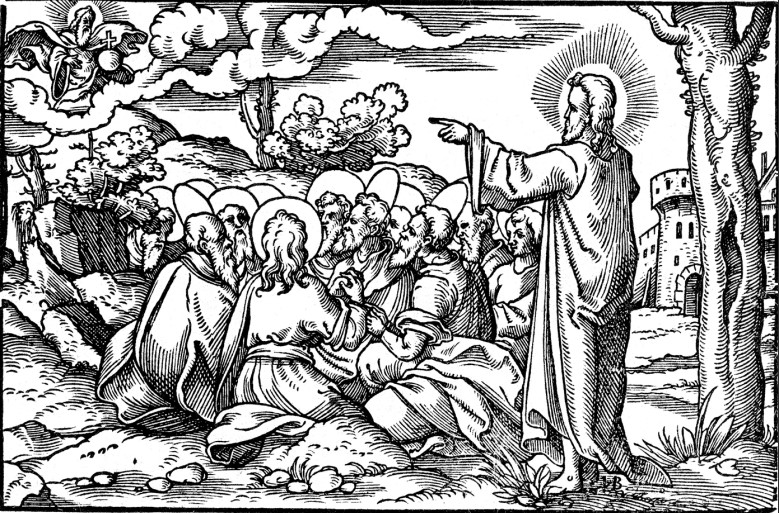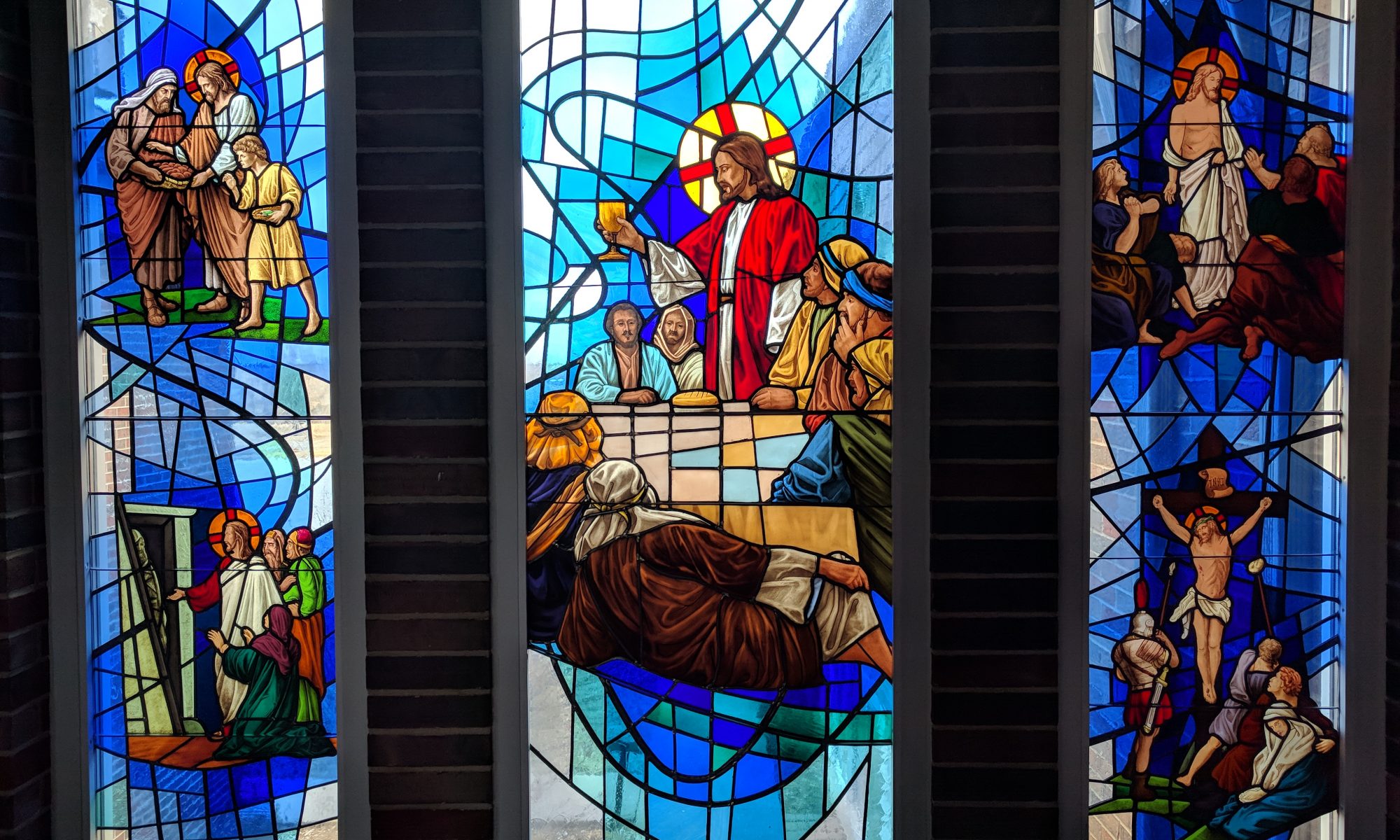
Lessons: Numbers 21:4-9, James 1:22-27, John 16:23-33
Hymns: LSB 668, 459, 663, 766, 478
Grace, mercy, and peace to you from God our Father and our Lord and Savior, Jesus Christ. Amen.
Today’s readings teach us about prayer. God invites us to pray, and He promises to hear us. God will answer our prayers according to His good and gracious will. He will answer them according to His timetable. He knows what is best for us, and He will use all things for our good.
An example of prayer is found in our Old Testament lesson from Numbers 21:4-9. The Israelites were in the wilderness where they wandered for 40 years. God’s people did not appear to be praying, but they were complaining. They had forgotten how bad it was to be slaves in Egypt, and they were now wishing they were back in Egypt. They were tired of the manna God provided for their food.
God responded to their complaining. He sent snakes that bit the people, and many died. That may seem rather cruel, but God had a plan in it. The people came to Moses in repentance. They admitted their guilt, saying, “We have sinned, for we have spoken against the Lord and against you.” Then they asked Moses to pray to God on their behalf, that He would have mercy on them.
God has a plan and purpose in the hardships we face. Often, it is to remind us that we are not in as much control of our lives as we may think and to teach us to rely on God. And, as we heard in this account from Numbers 21, God can use hardships in life to bring His people to repentance and turn to the Lord in prayer.
Moses prayed for the people. The response God gave was not what they requested. From a secular perspective, what God did would seem about as bad. Instead of taking the snakes away as they requested, God instructed Moses to make a bronze serpent and put it on a pole. Whenever someone is bit by a serpent, he looks at the bronze serpent on the pole and he lives.
From a spiritual perspective, the solution God provided was better than what they requested. How could this be when the people were still getting bit by snakes? Consider it this way: if God had taken away the snakes, it wouldn’t be long before the Israelites would return to their grumbling and complaining. But this way, God gave them a way to remember He is in charge, He will provide, they need to rely on Him, and they must keep on turning to the Lord in repentance. This repentance—confessing our sin and turning from it—is an important spiritual exercise for us Christians. God provided not only by healing them, but He was also teaching them how He would provide through His Son. Jesus spoke of this when Nicodemus came to visit with Jesus. He told Nicodemus, “As Moses lifted up the serpent in the wilderness, so must the Son of Man be lifted up, that whoever believes in Him may have eternal life” (John 3:14-15). God not only answered their prayer, causing His people to survive snake bites and keep on relying on Him as the source and giver of all good things, but He also provided a way to remind them of the coming Messiah. These people who were wandering in the wilderness were Israelites, the very people from which God promised the Messiah would come. Through them all the nations would be blessed. For the Lamb of God who takes away the sin of the world would be born from among them. The bronze serpent lifted high saved them. Even more so, Jesus the Messiah would be lifted high upon the cross to save the world from their sin.
We need this salvation. All around us we hear of sinful activity. We ourselves are filled with sin. And yet Christ Jesus came into this world to save it. He died on the cross to give us life. He rose from the grave for our justification. He lives so that we too may live eternally.
In today’s Gospel, Jesus invites His disciples to pray. The setting is the evening of Maundy Thursday. The words of our Gospel are the end of His discourse to His disciples before He prays in Gethsemane. They have probably left the Upper Room and are on their way to the Mount of Olives. It is not long before Judas betrays Jesus with a kiss and Jesus is arrested to be crucified.
Jesus says you may pray to the Father in Jesus’ name. He will give you what you ask in faith, that your joy may be full. This gets us to a key aspect of prayer. We pray in Jesus’ name. This does not mean that we must say, “in Jesus’ name we pray. Amen.” While it is fine to pray this way, the main point Jesus makes is to pray with faith in Jesus—that we recognize that we only have access to the Father through Christ. After all Jesus said earlier that same evening, “I am the Way, the Truth, and the Life. No one comes to the Father except through Me” (John 14:6). When we pray in faith, we are praying to our Triune God, believing in Him, and trusting Him to answer our prayers not according to our demands, but according to His gracious will.
We may wonder what we should be praying for. The primary guide we have is the Lord’s Prayer. Almost every petition addresses spiritual needs. The Fourth Petition addresses bodily needs—give us this day our daily bread. Our prayers are often made after we read our problems. For Martin Luther, he understood prayer to come about by reading God’s Word. He once said, “I have so much to do that if I didn’t spend at least three hours a day in prayer I would never get it all done.” Our reason would disagree with him. How can we get more done when we are now adding three hours to our schedules in prayer? There are two things to consider here. By praying, Luther was commending his life and daily work to the Lord. Luther was not pretending to be in charge. Also, Martin Luther understood prayer a little differently than many today. To him, prayer came about not by reading our problems, but by reading God’s Word. Those three hours of prayer included much time in Scripture—something we would all do well engaging in. For when we read the Bible, we should not just read it for some basic information. Instead, we should see in the Scriptures examples to pray and reasons to pray. When we read passages like today’s epistle, it gives us much to pray about—being doers of the word, bridling our tongues, visiting orphans and widows, and keeping ourselves unstained from the world (James 1:22-27).
Given that we do not know what to pray for as we ought, God gives us many prayers to pray. The main prayerbook for Christians is not what one may find at the bookstore, but the psalter. God’s people have been praying these 150 psalms for thousands of years. I’ve included in the bulletin a list of primary topics each psalm covers.
In addition to the psalms, there are many more prayers found throughout the Bible, and there are many examples of God’s people praying. Also, there are many fine prayerbooks available, including some which teach us how to pray the psalms. While there are a few good prayerbooks published by others, I highly recommend sticking with the prayerbooks offered by Concordia Publishing House.
Anyway, when we pray, we may pray to any person of the Holy Trinity. We do not pray to people who have died, to the saints, or angels. Only God has promised to hear us. He alone answers us.
We end our prayers with “amen,” which is an interesting Hebrew word. Amen can mean verily or truly, but the word is usually left untranslated. It is only found 30 times in the Old Testament. In English, Amen is found 56 times in the New Testament, and never in the Gospels. But in the original Greek, Amen occurs 129 times in the New Testament, with most of them in the Gospels. Why? Often, when the Hebrew word Amen is found in the Greek New Testament, it means truly or verily. In fact, that word is found in today’s Gospel. In John 16:23, Jesus said, “Truly, truly, I say to you, whatever you ask of the Father in My name, He will give it to you.” The words “truly, truly” in the Greek are Amen, Amen. Jesus says this frequently. He wants us to know He’s making a very important point. When Jesus said these words in our Gospel, this is the seventh and final time Jesus says “Amen, Amen” on the evening of Maundy Thursday, preparing His disciples for His upcoming crucifixion and preparing them to serve as His witnesses as they go out to preach the Word to the ends of the Earth, beginning in Jerusalem on Pentecost.
As Christians, you are encouraged to pray several times a day, such as when you get up, when you eat, and when you lie down. You are encouraged to pray with members of your household, whether it is by reading prayers, speaking memorized prayers, or by praying from the heart. You also pray when you gather in the Divine Service. Much of the liturgy is prayer. Many hymns are prayers. Even if you feel you know more doctrine and theology than your pastor, you should not pass up the opportunity to gather in God’s house. For you come to pray. You pray for yourself and for others. You pray with your brothers and sisters in Christ. What blessings we have in prayer!
In closing, let me read to you something Martin Luther said on prayer when preaching on today’s Gospel: Luther said, “I have no doubt that by our prayers various evil practices on the part of our adversaries have been thwarted. And if today still some good is to occur and evil be undone, it must be done through prayer. Therefore, do not make light of prayer, even though you might think that you are not fit or worthy to pray. Were that the case, no one would be in position to pray. May each Christian say to himself: Since prayer is so pleasing to God and so highly essential and beneficial for me and for the church, I shall attend church and pray as fervently as in me lies, for I am confident that prayer is not, nor can ever be, in vain.” (Rogate: House Postils; Vol. 6; p. 110). My dear friends, keep on praying, for God loves you, and He hears every word you think or say. Amen.
The peace of God which passes all understanding keep your hearts and minds in Christ Jesus to life everlasting. Amen

